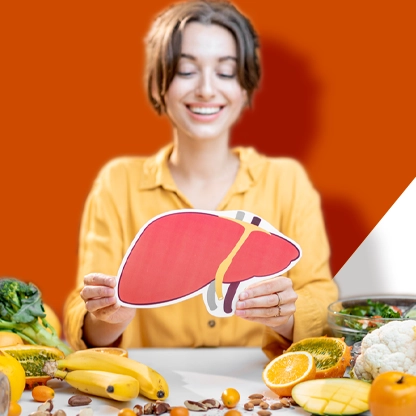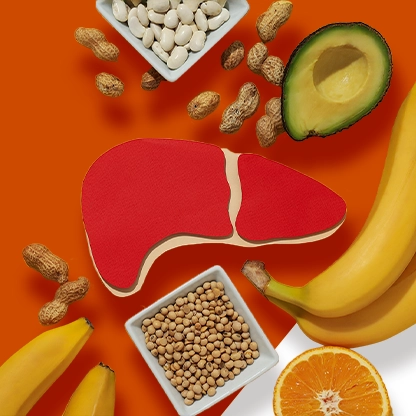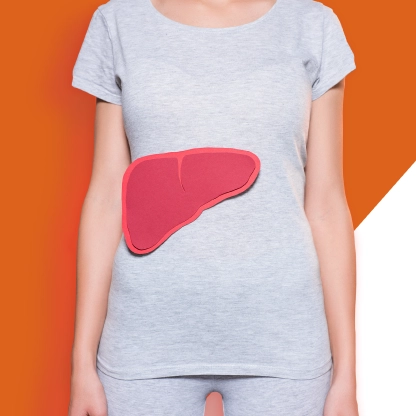.webp)
Article summary
Topic
Did you know the liver is the largest solid organ in the body? Although it’s an organ many tend not to think about as being vital to our survival the way our heart is, the liver performs hundreds of functions, but perhaps most importantly, it breaks down food and converts it into energy.i Because the liver is the processing centre of everything you eat and drink, you’ll want to know how to take care of it. Read on to learn more about liver function and how to keep yours in tip top shape.
Liver Detox
When it comes to removing toxins from the body, your liver is an essential part of the filtration system.ii Every day, your liver is hard at work converting toxins into waste products, filtering your blood, and putting vital nutrients to work. But, if you’ve heard about the so-called miraculous “liver cleanse,” you may need a little more information. The liver actually detoxifies itself, so the whole concept of a liver detox is actually rooted in myth. Saying that, your liver can definitely develop problems functioning correctly due to illness or damage, so it’s important to know the symptoms of a stressed liver.
Do you need a liver detox?
When your liver is struggling to do its job, you may notice a few symptoms, including:
- Yellowish tones in the skin and eyes
- Abdominal pain and swelling
- Swollen legs and ankles
- liver helps store
- Itchy skin
- Dark urine
- Constant fatigue
- Nausea or vomiting
- Loss of appetite
- More bruises on your skin.iii
If you notice any of the above symptoms, it may be a good idea to make an appointment with your healthcare professional – especially if the symptoms are persistent or if they are causing you any stress on a daily basis, as they can point to health conditions that need treating like hepatitis or other liver diseases.
A liver cleanse diet
Even though the liver is actively working for you, there are a few dietary habits you can adopt to help this organ do its thing.
Foods that are good for liver health include:
- Coffee, tea, and grapefruit juice: Coffee has been shown to help prevent or slow the progression of various liver diseasesiv, while tea and grapefruit juice can help protect against liver disease thanks to their antioxidant and anti-inflammatory properties.
- Blueberries and cranberries: Blueberries can help improve liver function through their antioxidant and anti-inflammatory capabilitiesv, while cranberries have shown promise in medical studies for inhibiting liver fat accumulation.vi
- Beetroot, and cruciferous vegetables: Like the berries described above, beetroot can also help prevent the accumulation of liver fat, while reducing inflammation and oxidative stress in the liver. Cruciferous veggies (like broccoli and cauliflower), have proven therapeutic effects on the liver, including preventing liver cancer.vii
- Nuts, oily fish, and olive oil: Want to cut down on liver fat? Look to walnuts, which can go a long way toward reducing your risk of fatty liver disease. Oily fish (like salmon, sardines, and tuna) can also help prevent liver fatviii. Another easy liver-helper to add to your diet is olive oil, which can lend antioxidant properties when sprinkled on salads or used in cooking.ix
These foods for liver detox are good for your liver because they are rich in a variety of nutrients and antioxidants. Their nutritional content is good at reducing inflammation and preventing damage to your cells.x
Even though these dietary habits are helpful for liver health, there are a few myths that it’s important to be aware of. One is that liver cleanses can help ease or reverse existing liver damage. Another myth is that liver cleanses can help you lose weight or help you achieve healthy equilibrium after you’ve over-indulged in food or alcohol.xi
There’s actually no evidence that liver cleanses can help you lose weight or reverse liver damage, but if you’re concerned about either of these issues, a good first step is to monitor your diet and exercise routines and talk to your doctor for guidance.
Accelerate liver regeneration with Phospholipids (Essentiale® Forte P)
What is a fatty liver?
It’s important to know that a healthy liver shouldn’t contain much or any fat. However, a build-up of fat in the liver can lead to a condition called hepatic steatosis. You may have heard this referred to as non-alcoholic fatty liver disease (NAFLD), but that term has recently been phased out in favor of metabolic dysfunction associated steatotic liver disease (MASLD). This disorder starts out with a relatively low and harmless level of fat around the liver and can gradually progress to MASLD and even cirrhosis and liver cancer if untreated.xiii
Healthy fat metabolisms
If you’re trying to prevent a build-up of fat in the liver, there a few lifestyle choices to follow for a healthy fat metabolism.
The key is to follow a well-balanced diet. If you have liver disease, this can prevent further damage or reverse some signs of damage, and if you don’t, this can help prevent any liver damage in the future.xiv
Here are a few ideas to follow on a daily basis to avoid liver disease:
- Eat 5 servings of fruits and vegetables each day.
- Limit starchy carbohydrates like potatoes, bread, rice, and pasta.
- Drink 6-8 glasses of water per day.
- Add beans, eggs, and other sources of proteins to your diet.
- Avoid foods high in fats, salts, and sugars.
And you can also try a dietary supplement to support your liver health and encourage a healthy metabolism, like Essentia Proactive.
FAQs About the Liver, Fat Metabolism, and Detoxification Process
There are lots of detox liver cleanse diets out there that you may find when you’re looking into liver health, but the main things you should be doing to help your liver function are limiting alcohol and sticking to a healthy weight and diet.xv
Apple cider vinegar (ACV) is well known for its antioxidant properties, so it’s often thought of as a good cleanse for the liver. Several studies have shown that apple cider vinegar can have some effect on limiting liver damage due to toxins. More research is needed, but ACV does show some promise in preventing liver disease.xvi
Although lemons may have some of the same antioxidant properties as apple cider vinegar, it’s unlikely that drinking lemon water will provide any notable detoxification. Experts say that what’s more important is just to drink plenty of water on a daily basis. But, if you do choose to add lemon to your daily water intake, you could be getting more vitamin C, potassium, and antioxidants.
As mentioned above, your liver is hard at work doing its important job of filtering toxins and converting food into energy, so there’s not much you need to do to help it along. Staying hydrated is one way to help your liver, and drinking water with lemon can add some vitamin C to your life, but there’s nothing specific that you can drink before bed to help your liver detox.
The liver is often referred to as a factory simply because of the many hundreds of functions it performs every day. It converts food into energy and stores vitamins, hormones, cholesterol, and minerals for when your body needs them.xvii
Liver failure refers to when your liver starts to lose its ability to function normally and regulate normal metabolic functions. It can be sudden or long term, in which case it is referred to as chronic liver failure, and it’s often the result of viral hepatitis, alcohol abuse, or cancer.xviii
When it comes to liver health, it’s vital to remember that this incredible organ is doing its important work every day, even without your intervention. The most important things to keep in mind for liver health are the same things that keep you healthy in other ways – following a balanced diet, staying hydrated, and living an active lifestyle.
- https://ods.od.nih.gov/factsheets/Choline-HealthProfessional
- https://www.webmd.com/vitamins/ai/ingredientmono-436/choline
- https://www.hsph.harvard.edu/nutritionsource/choline
- https://lpi.oregonstate.edu/mic/other-nutrients/choline
- https://www.healthline.com/nutrition/what-is-choline
- https://my.clevelandclinic.org/health/drugs/22202-choline-supplement
- https://www.medicalnewstoday.com/articles/327117
- https://www.sciencedirect.com/topics/medicine-and-dentistry/choline
- https://www.fda.gov/food/food-labeling-nutrition/nutrient-content-claims-notification-choline-containing-foods
%20(1)%20(1).webp)
.webp)




